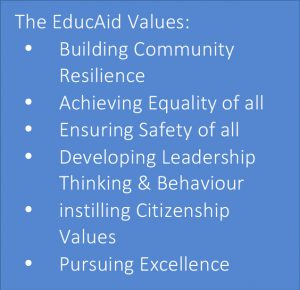How important is teaching ethics in the classroom? How do we instil a moral compass in every student?
When we teach, we are the catalysts for the development of the next generation. As Helen Caldicot said, ‘Teachers are the most responsible and important members of society because their professional efforts affect the fate of the earth.’ There are of course the reductionist and utilitarian approaches that see education as preparation for jobs but there are very few teachers who joined or stay in the profession for that reason. The far more exciting purpose of education that is to be the catalyst for the realisation of the full human potential of each child in our care is what drives us. The full human potential cannot be understood without the development of strong values and a clear sense of purpose that to be fully human is to refuse all actions and thoughts that reduce our humanity.
 The brilliant Brazilian educator, Paulo Freire, maintained that it was impossible to educate neutrally and that one either educated to uphold or subvert the status quo. If the status quo is that the ‘haves’ have and the ‘have nots’ have not, we are surely called as teachers to subvert this and do all we can to help oppressors just as much as the oppressed to understand that oppression in all its forms dehumanises all those involved. The oppressors are dehumanised by oppression just as much as the oppressed.
The brilliant Brazilian educator, Paulo Freire, maintained that it was impossible to educate neutrally and that one either educated to uphold or subvert the status quo. If the status quo is that the ‘haves’ have and the ‘have nots’ have not, we are surely called as teachers to subvert this and do all we can to help oppressors just as much as the oppressed to understand that oppression in all its forms dehumanises all those involved. The oppressors are dehumanised by oppression just as much as the oppressed.
In EducAid, our values are threaded through everything we do. We call our way of working ‘Every Voice Counts’ and try and check ourselves in all subjects and sessions against the EducAid values constantly. Our learners work in mixed age families to discuss these issues and ensure that the world we create within the school upholds the values. We maintain that if the children learn, while at school, that they have the right and responsibility to use their voice to make their immediate environment better, they are far more likely to expect to continue doing the same when they leave school.
We not Me!
In one way, I feel that particularly in a context such as Sierra Leone, where education has so often been used in the past as a tool of suppression to keep the less educated down, we should think carefully about enhancing the skills and knowledge of those whose values may be damaging to the community. If those that are better skilled and have more knowledge are selfish, will they use it to further damage the country? We need to be sure that in all we do we call for a focus on ‘we’ not ‘me’. At what point does one give up on a student and refuse to teach them further? That of course is a difficult one. Teachers are generally inveterate optimists and believe that the potential they detect within their pupil is just below the surface and about to blossom. So, we would rarely ever conclude that anyone was beyond hope but we need clearly to know that high scores in numeracy and literacy are completely insufficient measure of success. A true measure of success is how close one is to love; how close one is to genuinely being a conscious, reflective citizen with a focus on the other before the self. Challenging? Of course this is challenging! But this is also why teaching is the most wonderful, exciting, exhilarating profession to be in. Where else can one be involved in story after story of change, of overcoming adversity, of knowledge defeating ignorance, of a seed blossoming into another amazing human ready to make their contribution to making the world a better place?
If you would like to support EducAid’s work with vulnerable young Sierra Leoneans, please go to Donate Now. If you would like to know more about EducAid’s work, please go to our Home Page.